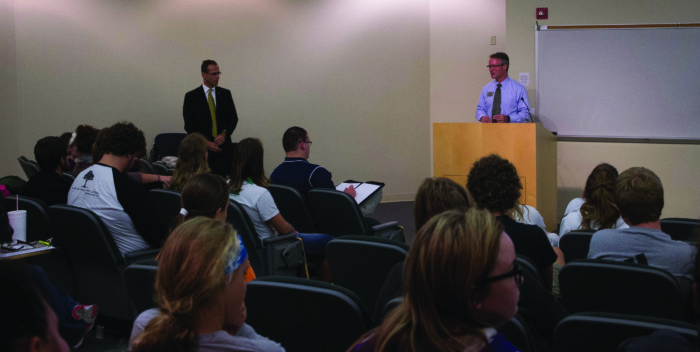Tuition Increases 7% Overall for 2017-18 School Year, 4.5% Percent Increase for Returning Students
President Brian Friedrich and Senior Vice President Scott Seevers discusses the tuition increases and changes in FAFSA with students at the Sept. 16 Student Senate meeting. Photo by Anyssa Neustel.
by Benjamin Middendorf
The total yearly tuition at Concordia will rise from $36,280 in the 2016-17 academic year to $39,100 for the 2017-18 academic year, an increase of approximately 7 percent. In the past, tuition has increased by 4-5 percent each year and, according to Senior Vice President of Enrollment, Marketing and Management Scott Seevers, this lower number was cited to visiting students and incoming freshman in previous years as the average increase they could expect. An additional supplement for returning students will lower the total increase to around 4.5 percent.
Seevers and President Brian Friedrich presented information on the increase to the Student Senate on Sept. 16. An open invitation was extended to Concordia students over email to attend this meeting.
In the past, this information was relayed to students and their parents in the spring, with last year’s changes being announced on Feb. 9. The much earlier date was possible due to changes to the Free Application for Federal Student Aid (FAFSA) program by the government.
According to StudentAid.gov, students and their families can file for a 2017-18 FAFSA beginning on Oct. 1, 2016, instead of on Jan 1, 2017, as was the case in previous years.
The government also changed the year of required tax returns that are submitted with the FAFSA. Students and/or parents must now use tax returns from the “prior-prior year,” so the 2017-18 FAFSA will use returns from 2015.
These two changes mean that a tuition plan for the coming year could be prepared and presented to the Board of Directors much earlier than expected and then relayed to students.
According to Seevers, the change will make the most impact on high-school seniors making decisions about college but will also mean that returning undergraduates may receive award letters a bit earlier.
“If you file your FAFSA early, you could get your award letters before you go home for the summer,” Seevers said. “So if there are questions, and you need to work through some things on campus, you can do that earlier.”
Seevers also outlined some of the factors that have driven the increase in tuition.
“Some things that add cost to the operation are things like minimum wage…(and) inflationary costs of goods and services,” Seevers said. “Those go up every year, and we can’t control that a lot. I assure you that we’re running pretty lean on our budgets; there’s not a lavish spending going on anywhere in the university for the benefit of the university.”
“The second piece of the increase in tuition is really around investments,” Seevers said. “So there may be any number of investments that are going to be going on over the next two to three years that we have to fund.”
Seevers listed improvements to the accessibility of the Music Center, an additional parking lot, renovation to the North Plaza outside the Walz Human Performance Complex and continued investments in residence halls, with Dorcas and Esther Halls next up for renovations in the summer of 2018.
Another reason for such a large increase this year was feedback received by the admissions department from students and families considering Concordia, according to CFO and COO Dave Kumm. “In a brand perception and pricing sensitivity survey conducted for Concordia by a third-party research firm, there were indications supporting (the idea that)…being near the bottom of our peer group in price was a weaker university-brand position,” Friedrich said in an email interview. “One particular survey response comes to mind for me: given a choice, prospective students and their parents were much more likely to choose a higher tuition price and higher scholarships over a lower price with lower scholarships if the net costs to them would be the same. They associated higher tuition price with higher quality.”
Concordia was previously in the bottom three for total cost when compared to other CUS and similar private schools and in the top tier for academic quality, retention rates, graduation rates and other factors, according to Seevers. The increase will likely place Concordia in the top five for total cost.
“It blows my mind,” Kumm said. “As a finance guy, it makes absolutely no sense to me, because I would take a look at it and say ‘Here is the sticker price’ and go off of that. But it very traditionally would be that the admissions counselor would get information back from a student that says ‘Well, Midland’s offering me $10,000, and you’re only offering me $9,000. They must evidently appreciate me more than you.’”
Three of the incoming freshman scholarships levels were adjusted up by $500, and the highest level President’s Scholarship was increased by $1,000.
“I think that’ll bring a lot of people here,” junior Thaddaeus Ristow said. “Yeah, it’s an increase… but they’ve got to do what they’ve got to do to recruit. I think it’s a smart thing for them to increase tuition to increase scholarships; I totally understand where they’re coming from.”
Because the increase could make a very large impact on returning students, whose scholarships reflect the previous amounts, a decision was also made to give a $1,100 supplement to all returning students.
According to the presentation, basic tuition will rise from $27,880 to $30,400 ($29,300 when adjusted for the supplement). Standard room and board will rise from $7,800 to $8,100. Fees, which include technology, parking and facility costs, will remain unchanged, after being raised from $300 to $600 last year.
“I do think the tuition increase is quite a bit, and that kind of scares me,” Ristow said. “Finances for college are not the best thing for my family right now. I’m already taking out so many loans for this. But the $1,100 is a bonus. That’s cool.”
“Because of the way the admissions office will be able to adjust the package,…it gives us more need based aid,” Kumm said. “What it’s going to be able to do is help the students who are maybe a little bit needier, from a financial perspective. I think it’s going to allow students who want to be here to be a Lutheran teacher or go into whatever type of ministry or just want to be a part of Concordia…to actually achieve their plan. I think (adding) that dynamic into our population is going to be a strong plus for us moving forward.”
Both Friedrich and Kumm said that tuition increases in future years will be lower. “Increases will likely be slightly less than 4-5 percent over the next four years,” Friedrich said.














